The photo that has been the longest awaited in Spanish justice has finally taken place this Thursday a few minutes before 12:00 noon: for the first time, the King has been received at the doors of the Supreme Court by a woman. Isabel Perelló, the new president of the General Council of the Judiciary (CGPJ) and of the high court, has acted as hostess of the most solemn act of the judicial year just 24 hours after taking office, following the agreement reached in extremis by The new president of the Council, the progressive and conservative members of the Council, was in a hurry to close this pact in order to avoid the schism that the image of the recently renewed CGPJ would have meant if it had reached the opening of the judicial year with the presidency vacant a month and a half after the PSOE and the PP unblocked the renewal of the body after five years with the mandate extended. The appointment of Perelló has avoided this abyss and the new president has given her first speech before a packed Plenary Hall. “I receive this appointment as a recognition of all the women who work in the Administration of Justice, whatever the functions they perform,” she said.
With barely any time to take her place in office, Perelló’s speech was very brief, four pages delivered in just 15 minutes, but the new president has outlined her priorities in it, including restoring the governing body of judges and the Supreme Court from the damage they have suffered in the five years of blockage by the CGPJ. To do so, she described it as “essential” that the Council carry out the “enormous task” of filling the hundred or so vacancies in the judicial leadership, 27 of them in the high court. Perelló, who in addition to being the first woman to take office holds the first progressive-profile presidency in 28 years, has promised that the pending appointments will be made “with rigor, transparency and strictly respecting the principles of merit and capacity.” “We have the obligation to guarantee that the system for selecting magistrates leads us to the election of the best professionals,” she said.
In a speech addressed to the judges, but also to the political representatives present at the event, including the Minister of Justice, Félix Bolaños, the Vice-President Yolanda Díaz, and the President of the PP, Alberto Núñez Feijóo, Perelló has claimed the independence of the judicial career. “No power of the State can give indications or instructions to judges and magistrates on how they must interpret and apply the legal system. Only those States in which the division of powers is guaranteed are truly States of Law,” he warned, to then appeal directly to the parties, to whom he has made “a call” to respect the work of the judges. “The possible irregularities that could occur in the exercise of the jurisdictional function have their own mechanisms of correction through the appeal channels provided for in the procedural laws.” Perelló has asked that “unjustified attacks, which can undermine the legitimacy and reputation of the Administration of Justice or its members” be avoided.
J.J. Guillen (EFE)
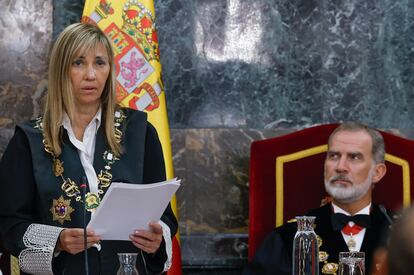
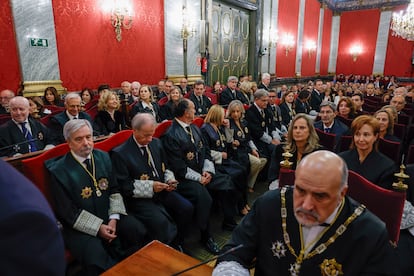
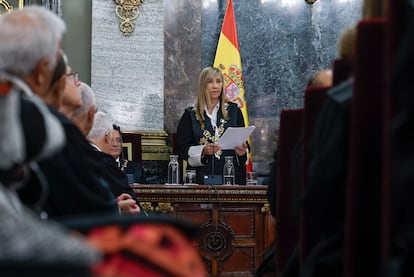
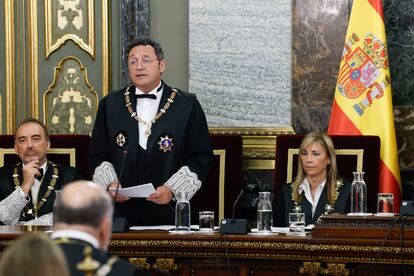
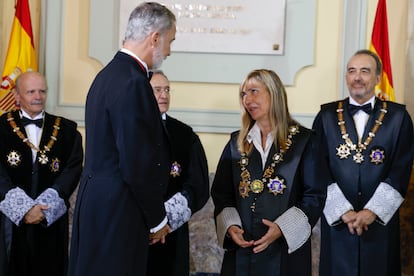
JJ Guillen (EFE)
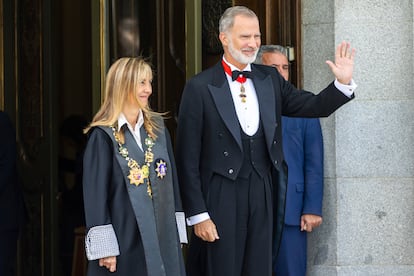
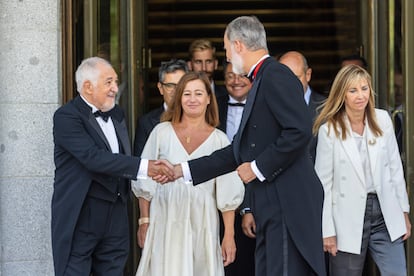

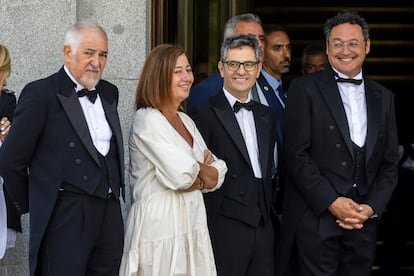
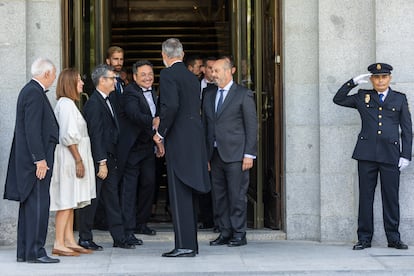

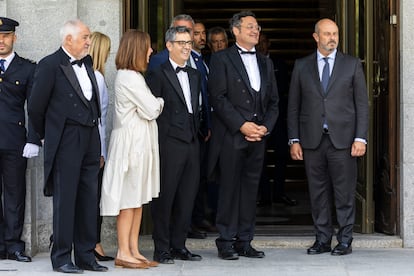
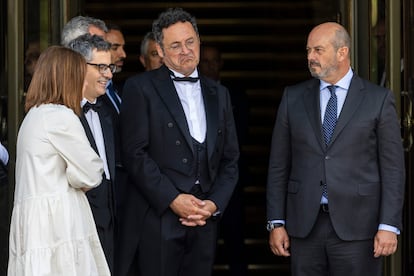

In a speech with repeated appeals to women’s equality in the Administration of Justice, the new president has warned that, although her election is a “historic event”, there is still “much to do”. “We had to wait until the 21st century to reach the Supreme Court. Even so, there is still a long way to go: women are still a minority in high judicial positions,” she warned, before sending a message of “recognition and gratitude” to all women who throughout history “have fought to defend the right to equality and to end the undeserved invisibility to which women have been subjected in the different areas of professional and social life.”
Before Perelló, the Attorney General of the State, Álvaro García Ortiz, spoke, warning of the danger of sowing hatred against migrant minors ―”history will judge us if when we talk about migrant boys or girls, we refer to them as if they were mere merchandise”— and warned of the “alarming number of suspensions of trials” that slow down the State’s activity against criminality and discourage professionals and victims.
What matters most is what happens closer to home. To make sure you don’t miss anything, subscribe.
KEEP READING

García Ortiz has claimed the “impartial” and “exclusively subject to the rule of law” action of the public prosecutor, and has appealed to a “change in the criminal procedural model” that combats the “ineffectiveness of an obsolete and disturbing system”. For this change, in which the courts are the only filter, he has defended the role of the Prosecutor’s Office in the criminal process and “its necessary and essential intervention”. “I claim that the Spanish Prosecutor’s Office as a whole, that the prosecutors do not limit themselves to following or assuming the criteria of the courts, but that they enrich it with their contributions, that they contribute to the advancement of law”. “The Prosecutor’s Office, an organ of constitutional nature, will never be an element of distortion of the system”, he added. “We are – and we can be even more – a powerful instrument of transformation with no other aim than the strict application of the law”.
During his speech, which lasted about 40 minutes, he also called for a reflection on the use of popular action in the proceedings given that it “increases the risk of prospective investigations” and “perverts the natural scheme” that only investigations “in which there are powerful indications of criminal responsibility” should reach the courts, the process. He also referred to the general access of the population to the Supreme Court, as an unsustainable system, and contributes, in his opinion, “to encouraging the use of the process for spurious purposes”. The prosecutor has officially presented the report of the public ministry, in which he has highlighted the increase of 11.1% of the total proceedings compared to 2022, and in which crimes against life account for 31% of the cases and 20%, crimes against property.
#Perelló #defends #role #women #judiciary #asks #political #power #interfere #judicial #system
